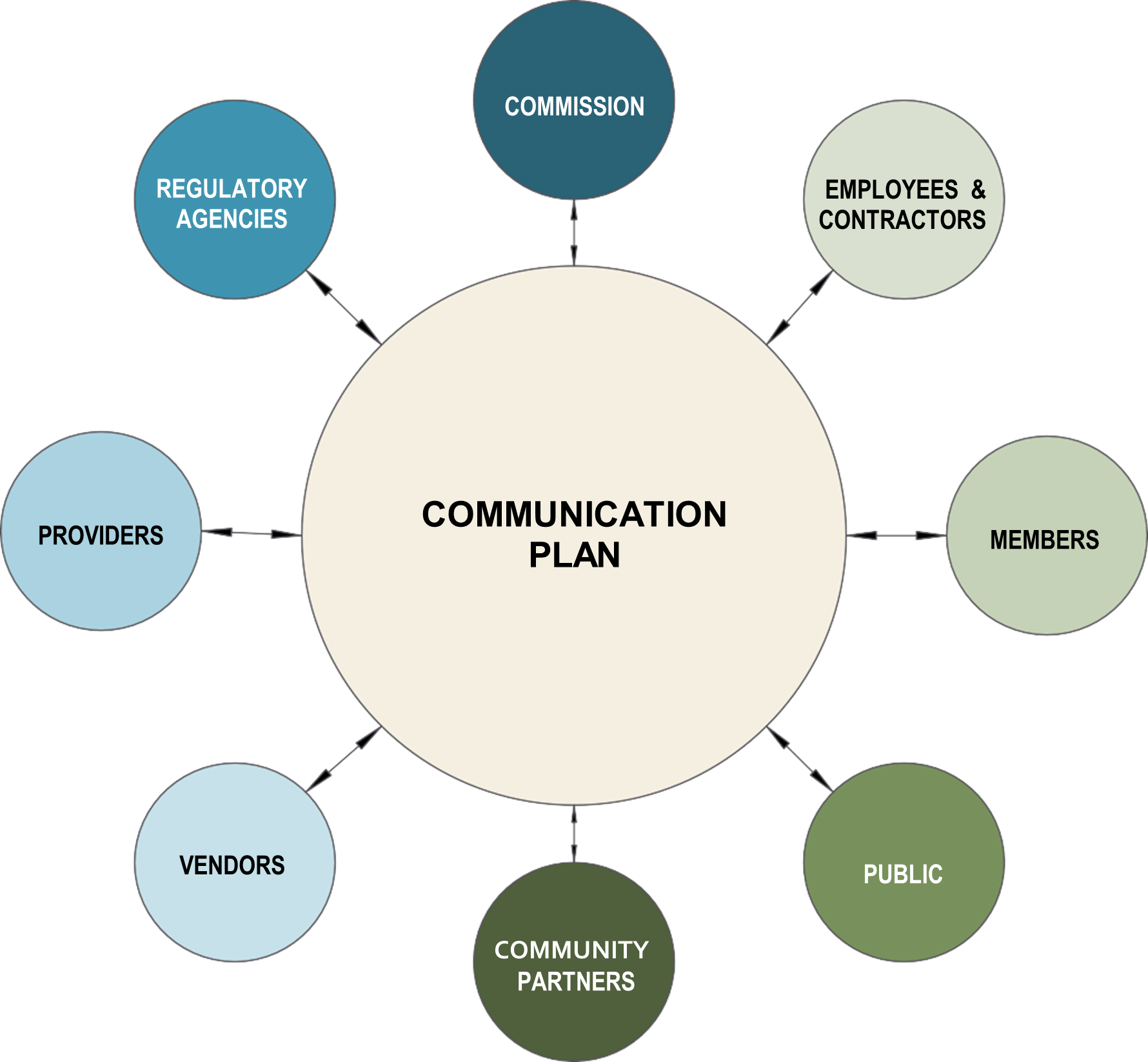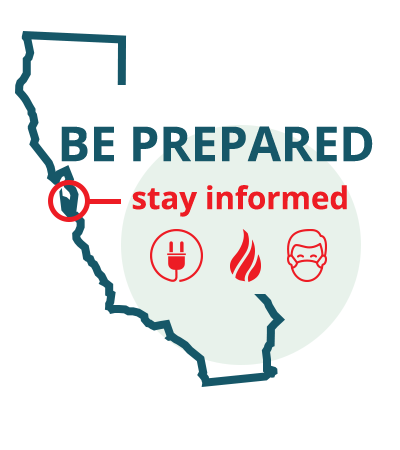Communications Plan for Incidents
HPSM is committed to providing a safe work environment for all staff. Timely communication in the event of an emergency is a priority. This document will be used as a guide to direct the flow of information to:
- Members
- Providers
- Regulatory agencies
- Employees and contractors
- San Mateo Health Commission
- Community partners
- Vendors
- Public
All responses to an emergency will flow through the Incident Commander and/or Leadership Team.
Emergency communication overview
The following chart indicates stakeholders that HPSM may need to communicate with in the event of an emergency or disaster:

Emergency communication procedure summary
The following is an at-a-glance summary of how to contact HPSM stakeholders in the event of an emergency or disaster.
When a critical application failure, emergency or disaster is anticipated to impact services
Who to contact | Responsibility | What is communicated |
HPSM members | Chief Health Officer |
|
HPSM providers | Chief Operations Officer |
|
Regulatory agencies | Chief Compliance Officer (or alternate leadership member) |
|
San Mateo Health Commission | Chief Executive Officer |
|
Community partners (i.e., ILS, | Community Partner Liaison (HPSM Business Owner) |
|
HPSM vendors | Vendor Liaison (HPSM Business Owner) |
|
Public | PR/Communications Spokesperson |
|
When an incident is anticipated to impact employees’ ability to get to work or perform regular duties
Who to contact | Responsibility | What is communicated |
HPSM employees and contractors | Incident Commander / Backup |
|
Emergency communication procedures
HPSM members
The Chief Health Officer or designee shall coordinate contact with HPSM members in the event of an emergency. If the situation allows for prior notification (such as Public Safety Power Shutoffs), HPSM will reach out to identified members prior to the event. In emergent situations, the plan’s cloud-based call center will be the hub of communication with members. Call scripts related to the specific emergency being addressed will be available to call center representatives including a Public Safety Assessment. An example of a call script can be found below in Appendix A. Information on access to covered services can be found in the HPSM Member Emergency Preparedness Plan.
HPSM providers
The Director of Provider Services or designee shall contact HPSM network providers as needed depending upon the incident. This may include communication via the HPSM website, by telephone or by fax-blast. In addition to HPSM providing updates to its network, providers are required to notify HPSM Provider Services within 24 hours of an emergency if the provider closes, is unable to meet the demands of a medical surge or is otherwise affected by an emergency.
Regulatory agencies
In the event of a disaster that affects HPSM’s ability to provide services to its members, the Chief Governance and Compliance Officer (CGACO), or if unavailable, a member of the leadership team, shall contact DHCS, DMHC and CMS regulatory agencies by email and/or telephone. These guidance documents should be used if the CCO is unavailable to notify these agencies directly. The CEO or designee may identify another member of HPSM staff to perform the notification function and to function as the main contact with regulatory agencies until such time that another individual assumes that responsibility. HPSM will promptly comply with all DHCS Emergency directives. Please see Appendix B for the Regulatory Agency Communication Checklist. Please see Appendix C for an email/call script to be used for these communications.
Regulatory reporting instructions
In addition to direct notification/communication, HPSM will comply with any directives from federal, state or county agencies regarding reporting on the status of operations during an emergency. HPSM will also report out within 24 hours of a federal, state or county declared state of emergency located within our service area.
The plan will also notify DHCS as to whether it has experienced or expects to experience any disruption to its operations. HPSM will report the status of its operations to DHCS at least once a day or otherwise as directed by DHCS.
Reported elements will include:
- Number of members in service area affected
- Out of the above number, the number of medium to high-risk members
- Network provider site closures by provider type
- Number of members served at each closed site
- Number of hospitalized members who need to be transferred
- Where these members were transferred
- A list of alternative providers or facilities for each closed network provider
- Number of network providers’ offices that are closed
- How HPSM is communicating with impacted members, network providers, subcontractors and downstream subcontractors
- Actions HPSM has taken or will take to meet the continued health care needs of its members
- Network provider, subcontractor, downstream subcontractor or member issues HPSM has been notified of
Employees and contractors
In the event of a fire or other emergency situation at the 801 Gateway site, the Incident Commander shall ensure that all employees, contractors and visitors are notified as soon as possible using the building’s alarm system and all other non-ambiguous audible and visual alarms.
The Incident Commander shall provide special instructions to all employees and contractors via the public address system, by use of a portable “Bull Horn” loudspeaker (if available) or by Alert Media (text, email, phone call or web).
If a fire or emergency situation occurs after normal business hours, the Incident Commander shall contact all employees not on shift and advise them of the status of future work via Alert Media (text, email, phone call or web).
Alert Media is a mass notification system which will be used to send text (SMS), email and phone notifications to HPSM employees, contractors and other stakeholders in the event of an emergency or disaster. Messages can be sent simultaneously using all three methods.
Recipients can reply with their status, and information is tracked on the HPSM Alert Media web portal.
San Mateo Health Commission
The Chief Executive Officer or Chief Operating Officer shall contact the San Mateo Health Commission members by email and/or telephone to provide information on the nature of the incident, potential impact to members and providers, and anticipated duration of the incident.
Community partners
The Community Partner Liaison shall contact their respective community partners by email and/or telephone to provide information on the nature of the incident, potential impact to members and providers, and anticipated duration of the incident. If the community partner is likewise impacted by the incident, the Community Partner Liaison will ascertain information about the partner’s business continuity plan and service restoration.
HPSM vendors
The Vendor Liaison shall contact the vendor by email and/or telephone to provide information on the nature of the incident, potential impact to members and providers, and anticipated duration of the incident. If the vendor is likewise impacted by the incident, information of the vendor’s business continuity plan and service restoration will be ascertained.
The public
The company Public Relations / Communications Spokesperson will contact public agencies depending upon the incident and if media coverage of the situation is expected. Individuals who are not
designated as official representatives of HPSM are not permitted to talk with the media under any circumstances.
Appendix A – Sample Call Center Script
Hello [member name], this is [staff name and title] with the Health Plan of San Mateo. I am contacting you to notify you of a [insert if applicable
Public safety assessment:
- Who do you live with?
- If living alone, do you have friends or family members that can assist with an evacuation if necessary?
- If you have caregivers, are they still coming to see you, or are you worried about not having enough help?
- Do you have enough medications? Do you anticipate refill needs in the next 2 weeks?
- Do you have all of your medical supplies (such as incontinence supplies, oxygen and wound supplies)?
- Do you need additional supplies?
- How will you continue to use equipment that runs on electricity, such as dialysis, electrical lifts, etc.?
- Do you have a safe back-up power supply and how long will it last? Do you need batteries for your equipment?
- Do you have enough food and access to meals?
- Are you familiar with evacuation sites near your area?
- Do you currently feel safe in your environment? If not, do you have an evacuation plan?
- Do you need a specially equipped vehicle or accessible transportation?
- Do you need me to connect you with other resources? Is there any other type of services that you feel you need at this time?
Appendix B – Regulatory Agency Communication Checklist
- Notify all three agencies in the Regulatory Agency Communication Contact List
- Describe the type of disaster that has occurred
- Describe the limitations the disaster has placed on HPSM’s ability to do business as usual
- Do not speculate as to when business as usual will resume; do commit to providing updates as they are available
- In the event the Chief Compliance Officer (CCO) is available to handle communications, hand off all prior communications between yourself and the agencies to the CCO
Appendix C: Regulatory Agency Email/Call Script
Hello [agency contact], this is [staff name and title] with the Health Plan of San Mateo. I am contacting you on behalf of the Chief Governance and Compliance Officer, Ian Johansson, to notify you of a [insert if applicable <natural>] disaster.
[Choose one of the following, and fill in the blanks as appropriate:]
- [If natural disaster] As you already know, the [disaster type] has affected our members’ ability to access care and services under normal circumstances. We have removed restrictions such as prior authorization requirements to ensure our members can access care in the most expedient way possible.
- [If other disaster] HPSM recently experienced a/an [describe disaster, e.g., power failure, loss of facilities, etc.]. This event has [describe limitations due to disaster, e.g., system failure], which has limited HPSM’s ability to provide access to care and services under normal circumstances. HPSM has taken the following steps to ensure access to care and services until normal operations are able to resume: [describe steps here.]
I will be your primary contact regarding our disaster response. All of our communications will copy the CEO, Pat Curran and the Chief Governance and Compliance Officer, Ian Johansson. If you need any additional information from us, please do not hesitate to contact us at your convenience.
Thank you, [Staff Name]
